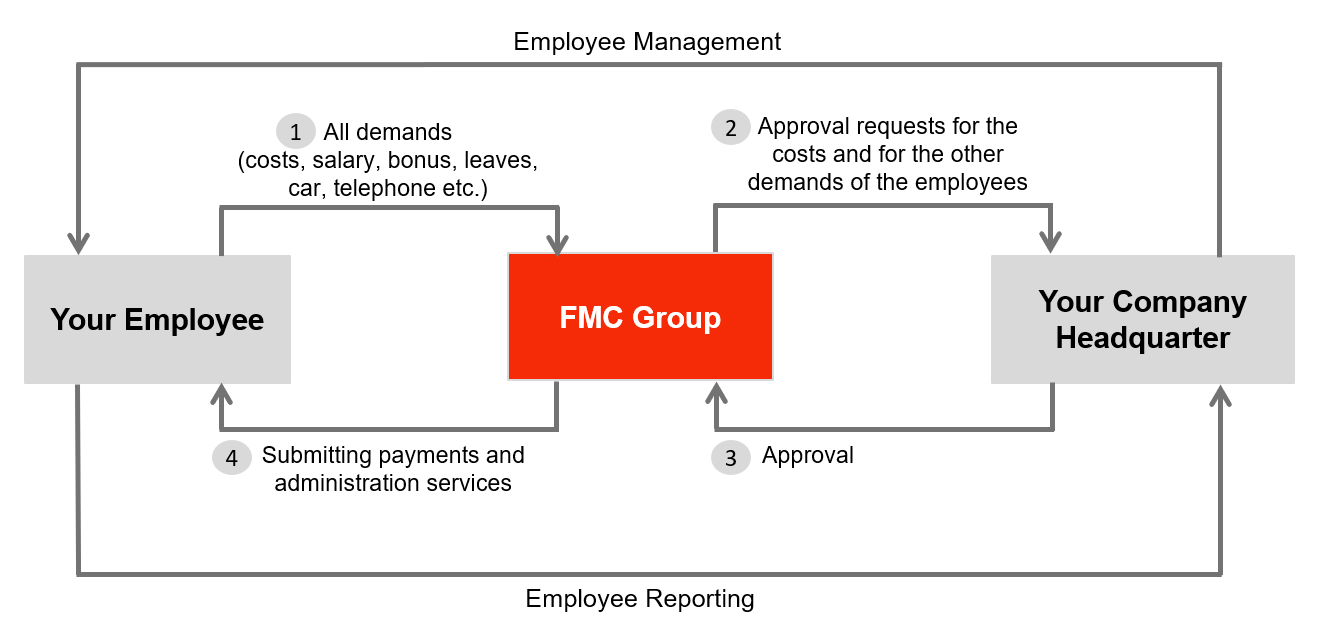
Employee Leasing in The Netherlands
Employee Leasing Netherlands offers several advantages, including compliance with Dutch labor laws, attracting and retaining top talent, reducing the cost of hiring and onboarding, and improving employee productivity and morale. The Dutch market is attractive to companies thanks to its strong economy, favorable business environment, central location, and attractive tax regime.
FMC Group offers a wide range of employee leasing services in the Netherlands, including recruitment and hiring, payroll and taxes, HR administration, benefits and insurance, and employee support. With FMC Group’s help, companies can quickly achieve their goals in the Dutch market.

Get in touch with us

Advantages of Employee Leasing in the Netherlands
- Employee leasing in the Netherlands can help companies ensure they are fully compliant with all the relevant requirements of the Dutch labor law, saving them time and money, and allowing them to avoid costly fines and penalties.
- The Netherlands has a competitive labor market and employee leasing helps businesses attract and retain top talent by providing a flexible and supportive work environment.
- Employee leasing helps companies reduce the cost of hiring and onboarding new employees, as FMC Group takes care of the entire process, from recruiting and interviewing candidates to processing payroll and taxes.
- Employee leasing helps with improving employee productivity and morale by providing them with all the support and resources they need to be successful, despite being in a different country from their employer.
Employee Leasing Services Offered by FMC Group
- We find and hire the best candidates for your team, taking care of the entire process from job posting to onboarding.
- We handle all aspects of payroll and taxes, ensuring that your employees are paid accurately and on time and that you are in compliance with all Dutch laws and regulations.
- We take care of all the HR paperwork, from employment contracts to leave management, so you can focus on running your business.
- We negotiate and implement competitive benefits packages for your employees, including private health insurance if needed.
- We maintain regular contact with you and your employees to ensure that everyone is happy and supported.
Management and Reporting Flow of Employee Leasing Services

Advantages of the Dutch Market
- The Netherlands has a strong and stable economy, with a low unemployment rate and high GDP per capita of around EUR 68,700, which is one of the highest in Europe. The Netherlands also has a budget surplus, making it one of the few countries in Europe with a balanced budget.
- The Netherlands has a favorable business environment, with a strong rule of law, transparent regulations, and a skilled workforce, making it easy for businesses to grow quickly. According to the World Economic Forum’s 2019 Global Competitiveness Report, the Netherlands has the 4th most competitive economy in the world.
- The Dutch workforce is well-educated. The 2019 Global Competitiveness Report ranks the Netherlands as having the 4th most skilled workforce in the world and, according to the OECD, around 93.9% of the Dutch population have at least graduated from high school. This gives businesses access to the talent they need to succeed.
- The Netherlands is centrally located in Europe, making it a good base for businesses that want to reach European markets. It is also well-connected to the rest of the world by air and sea. Amsterdam’s Schiphol Airport is one of the busiest airports in the world.
- The Netherlands has an attractive tax regime compared to some other Western European countries. It also has several tax treaties with other countries, which can reduce the overall tax burden.
Hiring in the Netherlands
Minimum Wage and Payroll
- The minimum wage in the Netherlands is set at EUR 1,995 per month for employees aged 21 years and over.
- Salaries are paid monthly on the last working day of the month.
- The 13th salary bonus is a common practice in the Netherlands. It is usually paid in November or December of each year.
Social Contributions and Taxes
| Employer Contributions | |
| Holiday Allowance | 8.00% |
| Healthcare Insurance | 6.68% |
| Invalidity Insurance Fund | 5.49% – 7.11% |
| Unemployment Fund | 2.64% – 7.64% |
| Child Care Premium | 0.50% |
| Work Resumption Fund and Sickness Benefits Act | 0.21% – 3.36% |
| Total | 23.52% – 33.29% |
| Employee Income Tax | |
| Up to EUR 38,703 per year | 9.28% |
| Between EUR 38,703 and EUR 73,031 | 36.93% |
| From EUR 73,031 | 49.50% |
Working Hours and Overtime
- The legal working hours limit in the Netherlands is 60 hours per week, but the common practice is to not exceed 40 hours per week and 8 hours per day.
- Overtime payment is compulsory. Its rate varies between 150% and 200%, depending on the contract.
Vacation Days
- Employees in the Netherlands have the right to 20 paid vacation days per year. However, the common practice is to give between 25 and 32 days of paid leave.
- The Netherlands celebrates 7 public holidays (8 days):
- New Year’s Day: January 1st.
- Easter Monday: March or April.
- King’s Day: April 27th.
- Liberation Day: May 5th.
- Ascension Day: June or July.
- Whit Monday: June or July.
- Christmas Holiday: December 25th – 26th.
Parental Leave and Sick Leave
- Pregnant employees are entitled to 16 weeks of fully paid maternity leave, including 4 to 6 weeks before the expected due date and 10 to 12 weeks after birth. Employers cover the employee’s pay during this period but are later partially reimbursed by the Employee Insurance Agency.
- After an employee’s partner gives birth, they are themselves entitled to 1 week of paid leave, which can be taken within the first 4 weeks following birth. Employers must pay the full salary of their employees during this week. Employees can also extend their leave of up to 5 weeks, to be taken within the first 6 months after birth. This extended leave is covered by the Employment Insurance Agency at a rate of 70% of the regular pay.
- Parents in the Netherlands are entitled to 26 weeks of parental leave. The first 9 weeks have to be used within the first year after the child’s birth and are covered by the Employment Insurance Agency at a rate of 70% of the regular salary. Meanwhile, the remaining 17 weeks can be used until the child reaches the age of 8 but they are unpaid.
- Employees are entitled to paid sick leave for up to 2 years, where they receive 70% of their regular salary, but it is common practice to pay 100% of the salary during the first year and 70% of the salary in the second year. The employer is the one in charge of covering the wages during sick leave.
Notice Period
- The notice period for resigning employees depends on their seniority: 1 month for less than 5 years, 2 months for between 5 and 10 years, 3 months for between 10 and 15 years, and 4 months if they have been working for the same employer for more than 15 years.
Further Useful Information
You can access more detailed information about labor laws and social security in the Netherlands on the website of the Dutch Labor Authority.
